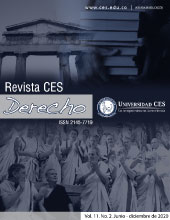¿Cuándo una investigación se considera realmente innovadora?: Retos epistémicos en la producción de nuevos conocimientos en el derecho
DOI:
https://doi.org/10.21615/cesder.11.2.3Palabras clave:
Epistemología, Ciencias Sociales, Conocimiento, Innovación, InvestigaciónResumen
La innovación es un criterio de calidad investigativa que ha tenido una pretensión generalizada en toda la comunidad académica; es exigido por las redes de investigación y corresponde a un factor de competitividad que se tiene en cuenta en la selección y priorización de proyectos. El proceso de investigación se constituye de responder sucesivas preguntas que corresponden a diversos elementos, entre los más importantes: el objeto de estudio, el objetivo general y la metodología. Estos elementos guían la investigación y responden respectivamente, los interrogantes de: qué se investiga, hasta qué punto y cómo se investiga un fenómeno particular. El componente innovador siempre se ha exigido desde la delimitación temática, no obstante, la metodología como etapa del proceso de investigación es la que evidencia la orientación de los productos generados y puede considerarse un indicador más relevante al momento de determinar la pertinencia y la innovación del proyecto investigativo.
Descargas
Referencias bibliográficas
Barrio Alonso, Cipriano. (2008) La apropiación social de la ciencia: nuevas formas. CTS: Revista iberoamericana de ciencia, tecnología y sociedad, vol. 4, no 10, p. 213-225.
Bunge, Mario. (1997) Epistemología: curso de actualización. Siglo XXI, Buenos Aires.
Fariñas Dulce, María José. (1994) Sociología del Derecho Versus Análisis sociológico del derecho, Cuadernos de Filosofía del Derecho. Núm. 15-16, p, 1013-1023.
García Garrido, Manuel y Eugenio Francisco (1990), Estudios de derecho y formación del jurista, Madrid, Dikinson.
Hurtado de la Barrera, Jacqueline, (2005) Como formular objetivos de investigación, Ediciones Quirón, Caracas (Venezuela).
Kelsen, Hans, (1983) Teoría pura del derecho, trad. de Roberto Venengo, México, UNAM.
Krause, Mariane. (1995) La investigación cualitativa: un campo de posibilidades y desafíos. Revista Temas de educación, vol. 7, no 7, p. 19-40.
Lucio, Jorge. (2013) Ciencia y tecnología en la universidad colombiana. COLCIENCIAS, Bogotá.
Melero Aguilar, Noelia. (2012) El paradigma crítico y los aportes de la investigación acción participativa en la transformación de la realidad: un análisis desde las ciencias sociales. Cuestiones pedagógicas, 21, 339-355.
Nicolescu, Barasab, (1996) La transdisciplinariedad: Un manifiesto. Mónaco, Rocher.
Pérez Matos, Nuria Esther y Setien Quesada, Emilio. (2008) La interdisciplinariedad y la transdisciplinariedad en las ciencias: una mirada a la teoría bibliológico-informativa. ACIMED [online], vol.18, n.4 Disponible en <http://scielo.sld.cu/scielo.php?script=sci_arttext&pid=S1024-94352008001000003 >. Citado el 18 de junio de 2019.
Rodríguez Cepeda, Bartolo Paolo. (2006) Metodología Jurídica. Oxford University Press, Ciudad de México.
Sabino, Carlos. (2014) El proceso de investigación. Editorial Episteme, Guatemala.
Witker, Jorge, (2008) Hacia una investigación jurídica Integrativa. Boletín Mexicano de Derecho Comparado, nueva serie, año XLI, núm. 122, mayo-agosto, pp. 943-964.
______, (1994) La investigación jurídica, México, McGraw-Hill.
Descargas
Publicado
Cómo citar
Número
Sección
Licencia
Derechos de autor 2020 CES Derecho

Esta obra está bajo una licencia internacional Creative Commons Atribución-NoComercial-CompartirIgual 4.0.



